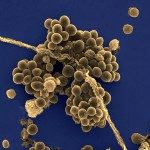Link to Pubmed [PMID] – 12624203
Microbiology (Reading, Engl.) 2003 Feb;149(Pt 2):407-17
The main causes of microbial death after heat exposure are not well understood. Here, it is shown that the heat-shock protein ClpP plays a major role in heat-induced growth arrest in Streptococcus agalactiae. A mutant lacking the ClpP protease was more sensitive to the inhibitory effects of heat, salt and oxidative stress than the isogenic wild-type strain. During growth arrest, this mutant displayed important modifications of its total protein content, including a decreased level of essential metabolic enzymes such as the alcohol dehydrogenase. Analysis of protein carbonylation demonstrated that the ClpP protease plays a role in preventing accelerated protein oxidation. Higher levels of oxidized DnaK, a key modulator of the heat-shock regulon, were observed in the ClpP mutant and these were increased following heat shock. Accumulation of oxidized/inactivated DnaK might explain why the ClpP mutant was unable to properly synthesize DNA and proteins, and why it exhibited an aberrant cell morphology. Even though ClpP plays a minor role in the virulence of S. agalactiae in a murine infection model, the data presented here point to the importance of ClpP in oxidative stress defence in preventing heat-induced cell alterations.

